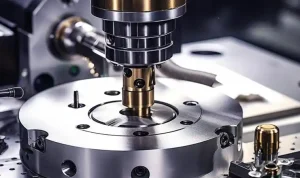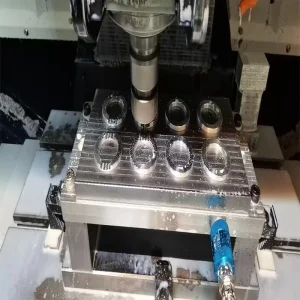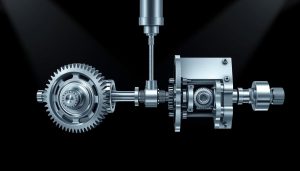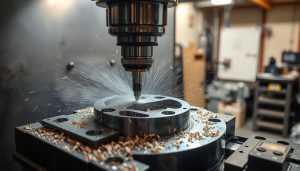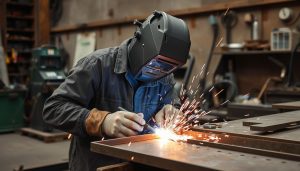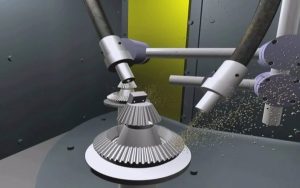In the fast-paced world of modern industry, precision manufacturing has emerged as a critical process for producing high-quality, complex parts and components. Precision manufacturing involves creating parts with an exceptional level of accuracy, consistency, and attention to detail. This specialized approach to manufacturing ensures that the final products meet the most demanding specifications, whether for aerospace, automotive, medical, or any other industry.
At the heart of precision manufacturing lies a relentless focus on tight tolerances, advanced technologies, and meticulous quality control. By employing cutting-edge tools and techniques, precision manufacturers are able to achieve unparalleled levels of precision, repeatability, and part functionality. This level of precision is essential for the creation of intricate, high-performance parts that are crucial to the success of many industries.
Key Takeaways
- Precision manufacturing is a specialized process that creates parts and components with exceptional accuracy and consistency.
- This approach is crucial for industries that require high-performance, complex parts, such as aerospace, automotive, and medical.
- Precision manufacturing relies on advanced technologies, strict quality control, and a focus on tight tolerances to achieve unparalleled levels of precision.
- The resulting parts are known for their superior functionality, durability, and suitability for demanding applications.
- Precision manufacturing is a key enabler for the production of cutting-edge products that drive innovation and progress in various industries.
The Basics of Precision Manufacturing
Precision manufacturing is a meticulous and exacting approach to producing high-quality parts and components. At its core, what makes a manufacturing process “precision” is the unwavering commitment to achieving exceptional accuracy, consistency, and repeatability. This is accomplished through the strategic deployment of advanced manufacturing technologies and stringent quality control measures.
What Makes a Process “Precision”?
The hallmark of precision manufacturing lies in its ability to consistently meet or exceed tight tolerances, often measured in microns or even nanometers. This level of precision is attained through the use of state-of-the-art machinery, advanced computer-aided design (CAD) software, and rigorous metrology techniques. By carefully controlling every aspect of the manufacturing workflow, from material selection to final inspection, precision manufacturing techniques ensure that the end product meets the most exacting specifications.
Key Technologies Used in Precision Manufacturing
- Computer Numerical Control (CNC) machining: Highly automated milling, turning, and grinding machines that can produce intricate parts with remarkable precision.
- Coordinate Measuring Machines (CMMs): Advanced measurement tools that accurately analyze the dimensions and tolerances of manufactured components.
- Additive manufacturing (3D printing): Cutting-edge additive processes that can create complex geometries with unparalleled accuracy.
- Advanced metrology and quality control systems: Sophisticated inspection and testing equipment that ensure the integrity and performance of precision-made parts.
By seamlessly integrating these advanced manufacturing technologies, precision manufacturing can deliver game-changing results in a wide range of industries, from aerospace and automotive to medical and electronics.
Why is Precision Manufacturing Important?
Precision manufacturing plays a crucial role in various industries, from aerospace and automotive to medical technologies. By leveraging advanced techniques and cutting-edge equipment, precision manufacturing applications enable the creation of highly accurate and reliable components that meet the stringent demands of these industry-specific manufacturing sectors.
Applications in Aerospace, Automotive, and Medical Industries
In the aerospace industry, precision manufacturing is essential for producing aircraft parts that must withstand extreme environmental conditions and operate with near-flawless performance. From turbine blades to landing gear components, these precision-engineered parts ensure the safety and reliability of modern aircraft.
Similarly, the automotive industry relies on precision manufacturing to create engine components, transmission parts, and other crucial systems that must function with high efficiency and durability. Precision manufacturing applications enable the production of these complex automotive parts with unparalleled accuracy and consistency.
Within the medical industry, precision manufacturing is vital for developing cutting-edge medical devices, surgical instruments, and implants. These precision-made components must adhere to the most exacting standards to ensure patient safety and superior clinical outcomes.
Meeting Strict Tolerances and Specifications
The ability to meet strict tolerances and specifications is a hallmark of precision manufacturing. By employing advanced technologies and meticulously controlling every aspect of the manufacturing process, precision manufacturers can ensure that the final products meet the stringent requirements of their respective industries.
| Industry | Key Precision Manufacturing Requirements |
|---|---|
| Aerospace | Tight dimensional tolerances, surface finish, and material properties |
| Automotive | High-precision engine and transmission components, tight assembly tolerances |
| Medical | Extremely tight tolerances, biocompatibility, and sterilization requirements |
By leveraging precision manufacturing techniques, industries can produce components that meet the most demanding specifications, ensuring optimal performance, safety, and reliability in their end products.

Advantages of Precision Manufacturing
Precision manufacturing offers a multitude of advantages that contribute to its growing popularity across various industries. From ensuring high accuracy and repeatability to enhancing part functionality and durability, this specialized approach to manufacturing delivers significant benefits that optimize production efficiency and long-term cost-effectiveness.
High Accuracy and Repeatability
One of the primary advantages of precision manufacturing is its ability to produce parts with exceptional accuracy and repeatability. By leveraging advanced technologies and precise control over production processes, manufacturers can consistently create components that meet the most stringent specifications, reducing the risk of defects and ensuring consistent quality throughout the production run.
Enhanced Part Functionality and Durability
Precision manufacturing techniques also play a crucial role in enhancing the functionality and durability of parts. By minimizing variations in dimensions, surface finishes, and material properties, manufacturers can create components that perform more reliably and have a longer lifespan, ultimately delivering greater value to end-users and reducing the need for frequent replacements or maintenance.
Cost-Effectiveness in Long-Term Production
While precision manufacturing may require a higher initial investment, the long-term benefits of this approach often outweigh the upfront costs. By optimizing production processes, reducing waste, and minimizing the need for rework or replacement, precision manufacturing can lead to significant cost savings over the life of a product, making it a cost-effective solution for high-volume or long-term production runs.

“Precision manufacturing is not just about achieving tighter tolerances; it’s about optimizing the entire production process to deliver superior quality, reliability, and cost-effectiveness.” – Industry Expert
By leveraging the benefits of precision manufacturing, businesses can enhance their competitiveness, improve customer satisfaction, and position themselves for long-term success in highly demanding markets. From aerospace and automotive to medical and electronics, the advantages of this specialized approach to manufacturing are widely recognized and valued.
Precision Manufacturing vs Traditional Manufacturing
In the realm of modern manufacturing, the contrast between precision manufacturing and traditional methods is becoming increasingly pronounced. Precision manufacturing leverages advanced technologies and techniques to deliver parts and components with exceptional accuracy, consistency, and performance – a stark departure from the more conventional approaches of the past.
Differences in Tools and Techniques
Precision manufacturing often employs sophisticated Computer Numerical Control (CNC) machines, laser cutting systems, and advanced metrology tools to achieve unparalleled levels of precision. These specialized tools and techniques allow manufacturers to work with tighter tolerances, produce complex geometries, and ensure a higher degree of repeatability compared to traditional manual or semi-automated processes.
Benefits in Complex and High-Performance Parts Production
The advantages of precision manufacturing are particularly evident in the production of complex and high-performance parts. Industries such as aerospace, automotive, and medical device manufacturing demand components with exacting specifications, and precision manufacturing methods are uniquely positioned to meet these requirements. By leveraging advanced manufacturing methods, precision-focused companies can deliver parts with superior functionality, durability, and reliability – attributes that are crucial in these demanding applications.
| Precision Manufacturing | Traditional Manufacturing |
|---|---|
| Utilizes advanced CNC machines, laser cutting, and metrology tools | Relies on manual or semi-automated processes |
| Achieves tighter tolerances and produces complex geometries | Typically has broader tolerances and limited part complexity |
| Ensures a high degree of repeatability and consistency | May experience more variability in output |
| Excels in the production of complex, high-performance parts | Better suited for simpler, high-volume parts production |
The contrast between precision manufacturing and traditional methods highlights the evolution of modern manufacturing. By embracing advanced technologies and techniques, precision-focused companies can deliver parts and components that meet the demanding requirements of cutting-edge industries, driving innovation and pushing the boundaries of what is possible in the world of manufacturing.
How Precision Manufacturing is Achieved
Precision manufacturing is a meticulous process that requires a combination of advanced technologies and expert techniques. At the heart of this approach lies the pivotal role of CNC machining, a computer-controlled manufacturing process that ensures remarkable accuracy and consistency in the production of complex components.
The Role of CNC Machining in Precision Manufacturing
CNC (Computer Numerical Control) machining is a highly versatile technology that allows for the precise fabrication of parts with tight tolerances. By utilizing computer-guided cutting tools, CNC machines can produce intricate geometries, intricate features, and exceptional surface finishes with remarkable repeatability. This makes CNC machining an indispensable tool in the realm of precision manufacturing processes.
The Importance of Material Selection and Handling
Alongside the advanced capabilities of CNC machining, the selection and handling of materials play a crucial role in achieving precision. Manufacturers carefully choose materials that possess the necessary properties, such as strength, durability, and dimensional stability, to meet the exacting requirements of precision parts. Additionally, the proper handling and storage of these materials ensure that their integrity is maintained throughout the manufacturing process, further contributing to the overall precision and quality of the final product.
“Precision manufacturing is not just about the equipment; it’s about the entire process, from material selection to final inspection. Every step must be executed with the utmost care and attention to detail.”
By leveraging the power of CNC machining and carefully managing the materials used, manufacturers can consistently produce parts that meet the stringent specifications demanded by industries such as aerospace, automotive, and medical, where precision is paramount.
Why Choose Shixinproto’s Precision Manufacturing Services
When it comes to precision manufacturing, Shixinproto stands out as a trusted partner for businesses seeking high-accuracy, custom parts. With years of experience and a commitment to excellence, the company has honed its expertise in delivering precision manufacturing solutions tailored to the specific needs of its clients.
Expertise in High-Accuracy, Custom Parts Production
Shixinproto’s precision manufacturing services are powered by advanced technologies and a skilled team of experts. From sophisticated CNC machining to meticulous material selection and handling, the company ensures every component meets the strictest specifications and tolerances. Whether you require intricate aerospace parts, complex automotive components, or precision medical devices, Shixinproto has the capabilities to bring your vision to life with unparalleled precision.
By leveraging their expertise in precision manufacturing, Shixinproto empowers its clients to achieve uncompromising quality, enhanced product functionality, and long-term cost-effectiveness in their production processes. With a focus on delivering exceptional results, the company’s precision manufacturing services are the preferred choice for businesses seeking to push the boundaries of what’s possible.
